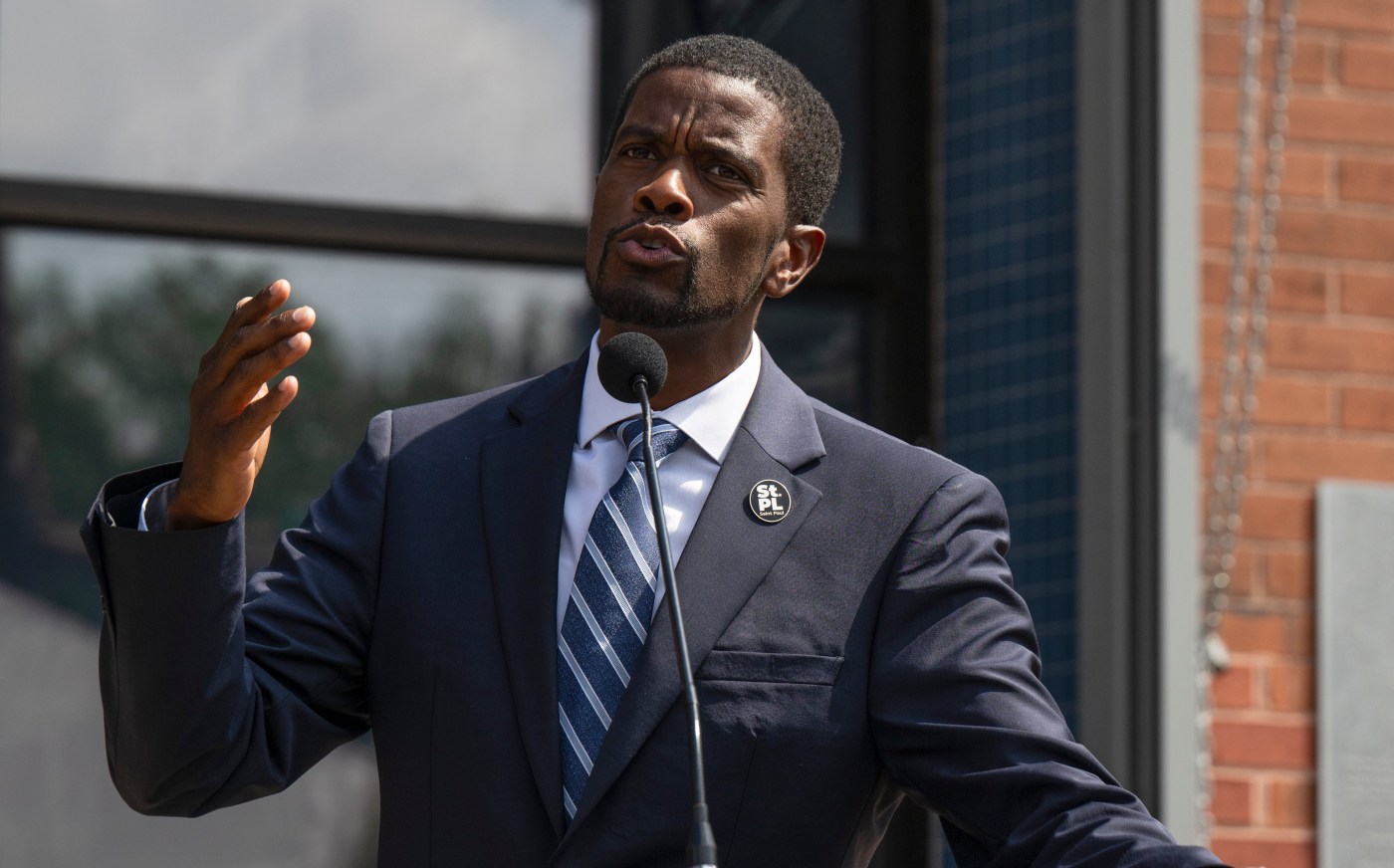
St. Paul Mayor Melvin Carter: Even if child care subsidies are approved, I won’t implement them
St. Paul Mayor Melvin Carter said Monday that a city ballot question calling for municipal child care subsides would be impossible to administer and cannot be adequately funded with the proposed $2 million to $20 million, 10-year property tax levy before voters.
In other words, even if St. Paul residents vote “Yes” to authorize the new tax levy, the mayor said he would not implement it, given that the creation of a new citywide entitlement program likely would cost six times as much to offer free care to kids in need, let alone others on a sliding scale.
“Can $120 million in basic programming be fit into $20 million of funding? I think the answer is no,” said Carter, meeting with a handful of reporters Monday at St. Paul City Hall.
“We’re asking voters if they want to buy a brand new Corvette for $30. Yes, I want to … but I can’t buy a brand new Corvette for $30,” said the mayor. “No matter what, we won’t deliver all the promises that are carried in this ballot question, whether we try or not. Nobody can and nobody will.”
The ballot language says a “Yes” vote would “authorize” the city to impose the new levy, but Carter noted that the wording does not mandate it and the city would be within its legal rights not to.
Council Member Rebecca Noecker, a leading proponent of the city subsidies, said voters in her doorway conversations with constituents understood what they are voting on.
Rebecca Noecker
“No public program covers every single possible participant, and people know that when they approve public programing, and the ballot question doesn’t say that it will,” said Noecker, during a break in door-knocking Monday evening. “It’s remarkable to hear that an elected leader in a democratic society would openly say he’s not going to accept the result of a democratic election. That’s alarming to me.”
Mayor’s letter to the city council
The mayor spelled out his concerns in a three-page letter to the city council last Thursday that casts doubt on consultant predictions that some 2,500 kids out of 10,500 eligible would be served by the initiative annually. Carter said a more accurate number would be closer to 400 children per year, and then only after a major funding boost.
The ballot question, which originated with the “St. Paul All Ready for Kindergarten” (SPARK) coalition, calls for the city to provide “subsidies to families and providers so that early care and education is no cost to low-income families and available on a sliding scale to other families.”
The mayor said the wording implies that the early childhood initiative would serve all kids in need, an impossible ask with the given funding source, which is a $2 million property tax levy increase in the first year, $4 million in the second year, $6 million in the third year and so on through $20 million in year 10.
“What does the ‘A’ in ‘SPARK’ stand for?” said the mayor. “The ballot question implies ‘all children.’ The (city council) resolution that authorized it says all children. The campaign website definitely says all children.”
Other aspects of the ballot question have also drawn close scrutiny from the mayor, who was the founding board chair of the St. Paul Promise Neighborhood school-based initiative and served as director of the state Office of Early Learning at the Minnesota Department of Education before first running for his seat.
“If there’s an elected official in City Hall who has expertise in early childhood learning, it’s me,” he said.
‘Not a serious attempt’
The mayor noted that consultants for the child care subsidy effort delivered their implementation plan to the city on Sept. 11, just nine days before early voting began, giving his office limited time to decipher how to launch a new city function with a budget slated to grow as large as that of the city library system.
“That’s not a serious attempt,” Carter said. “I think most people would say that’s laughable.”
In addition to funding child care subsidies that would follow children to facilities, the ballot question makes note of using the tax levy to “increase the number of child care slots and support the child care workforce.”
Asked by the city council how the initiative would fund new slots, a consultant acknowledged during her presentation to the council last month that those questions were beyond the scope of her report.
“She said it was not within the scope of this plan, and it’s not,” said Carter, calling those asks unfunded, pie-in-the-sky demands. “It’s contained within the ballot question.”
Carter has been a consistent opponent of funding citywide child care subsidies through property tax increases, but his efforts to veto the question before voters on the Nov. 5 ballot were overruled by the then-city council in August 2023.
“These are critiques we’ve been hearing and responding to for months now,” Noecker said. “We drafted the ballot question with his own city attorney’s office over a year ago. I think that the mayor is willfully misreading the ballot question and inserting words that are not there.”
Related Articles
St. Paul mayor says he won’t back $1.5 million supplemental insurance for retirees
Nina Moini named host of MPR News noon show ‘Minnesota Now’
Ramsey County races: Two running for District 7 county board seat
Indigenous Peoples Day celebrated with an eye on the election
Man arrested in shooting of coworker at St. Paul post office


